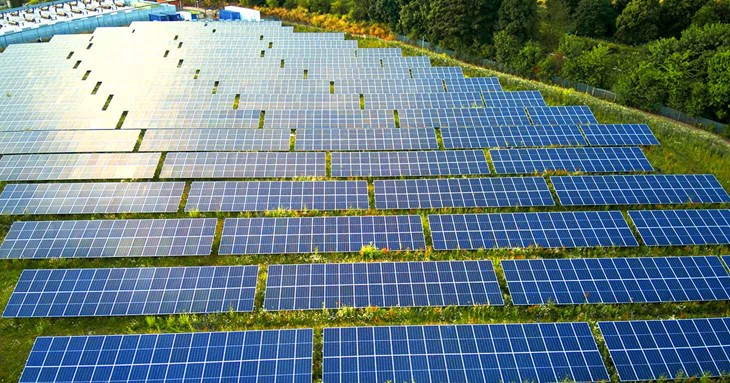Solar farm will generate and store green energy to power electric fleet
Published: 9 August 2022

Exeter’s solar farm and battery storage facility is nearing completion and will soon be powering the city’s electric fleet of vehicles and recycling centre with green energy.
The project is another big step towards Exeter ambition to become a Net Zero Carbon City by 2030.
The Water Lane Solar Park at Marsh Barton features 3,700 solar panels which will create more than 1MW of clean, renewable energy.
Funded by the European Regional Development Fund, the facility, built on an inactive landfill site, includes a substantial battery storage capacity to provide flexibility between peak generation and peak usage.
It will feed the power generated directly into the Council’s nearby Materials Reclamation Facility, and will charge the Council’s entire fleet of electric vehicles, including its three newly-operational electric refuse vehicles.
It is expected that energy from the solar farm will be used to charge the Council’s electric fleet of vehicles for the first time by the end of next month.
Cllr Duncan Wood, Lead Councillor for Climate Change, said the ability to generate green energy at a time of rapidly rising fuel costs was hugely important for the city.
He said: “This is an amazing site – it’s not just generating green energy but using new storage technology to meet the needs of our fleet and powering the recycling processes at the Material Reclamation Facility. We will be able guarantee that our electric vehicles going around Exeter are running on green electricity.
“That’s really important to us. It’s something we started creating quite a few years ago. We have been using solar panels across our buildings, like the huge array at the Matford Livestock Centre.
“Here we’ve got 3,700 solar panels 1MW battery storage, and that’s important because we need to keep the power supply to charge our vehicles and to run the recycling centre. That needs to be constant so we need the battery back-up.
“When it’s not that sunny the panels are still charging, but obviously the consistency of supply to charge up those large refuse trucks is important. We have also got a lot of electric vans and cars that the Council runs, and we want to ensure that they are charged on green energy.”
He added: “We are expecting that it will be operational next month. This is definitely a large step towards being net carbon neutral by 2030. The important thing is to cut down our emissions - that has to happen across the whole city.
“What we are in control of is the emissions that we generate. We want to lead and support and encourage the partners and residents of Exeter to cut down on their emissions, but what we really have control of is what we do as a Council, and this is a prime example of what we are doing to cut down on our emissions.”
Cllr Wood praised the Council’s Net Zero team for their work on the project and other measures which have cut energy use and emissions over recent years.
He said: “Taking on the climate change portfolio has been an incredible learning experience for me. I thought I knew about environmental issues, but I've got a lot to learn.
“What’s really great stepping into this role is seeing the work that the team has already done to make the city council Net Zero by 2030. An awful lot work has been done in all sorts of areas, and this solar farm is a significant step forward in terms of energy independence - generating power in a sustainable, green way and using it to reduce our emissions as a council.”
The solar farm is just one of a number of ambitious low carbon initiatives that the City Council is involved in to increase its use of renewable energy for day to day operations.
The Council plans to include battery storage systems at other sites where there are existing roof top arrays.
It already has a Photo Voltaic (PV) estate of more than 2MW, including a 1.5MW solar installation at the Livestock Centre, which produces enough renewable energy every year to power 180 homes.
The Council’s total energy consumption has fallen over the last decade, resulting in a reduction in carbon emissions.
Switching to an electric fleet of vehicles is also saving emissions.
The recent replacement of three of the 15 diesel refuse vehicles with fully electric ones is saving 10,500 litres of diesel per year for each vehicle - a total of 31,500 litres per annum. That’s more than a quarter of a million litres of diesel over their eight year lifespan.
The aim is to replace all diesel refuse vehicles with electric ones within the next six years, saving 157,500 litres of diesel per year.
The carbon saved on each electric refuse vehicle is approximately 27,000kg per year.
